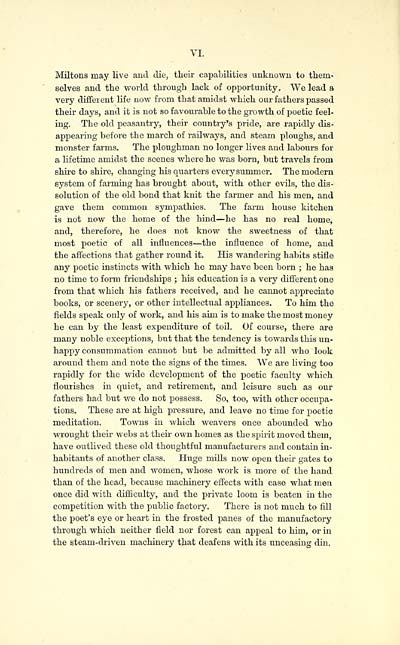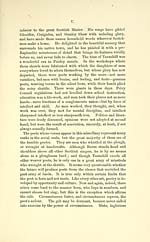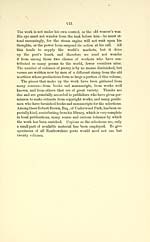Glen Collection of printed music > Printed text > Harp of Renfrewshire
(16) Page vi
Download files
Complete book:
Individual page:
Thumbnail gallery: Grid view | List view

VI.
Miltons may live ami die, their capabilities unknown to them-
selves and the world through lack of opportunity. We lead a
very different life now from that amidst which our fathers passed
their days, and it is not so favourable to the growth of poetic feel-
ing. The old peasantry, their country's pride, are rapidly dis-
api^earing before the march of railways, and steam ploughs, and
monster farms. The ploughman no longer lives and labours for
a lifetime amidst the scenes where he was born, but travels from
shire to shire, changing his quarters everysummer. The modern
system of farming has brought aborit, with other evils, the dis-
solution of the old bond that knit the farmer and his men, and
gave them common sympathies. The farm house kitchen
is not now the home of the hind — he has no real home,
and, therefore, he does not know the sweetness of that
most poetic of all influences— the influence of home, and
the afi"ections that gather round it. His wandering habits stifle
any poetic instmcts with which he may have been born ; he has
no time to form friendships ; his education is a very different one
from that which his fathers received, and he cannot appreciate
books, or scenery, or other intellectual appliances. To him the
fields speak only of work, and his aim is to make the most money
he can by the least expenditure of toil. Of course, there are
many noble exceptions, but that the tendency is towards this un-
happy consummation cannot but be admitted by all who look
around them and note the signs of the times. We are living too
rapidly for the wide development of the poetic faculty which
flourishes in quiet, and retirement, and leisure such as our
fathers had but we do not possess. So, too, with other occupa-
tions. These are at high pressure, and leave no time for poetic
meditation. Towns in which weavers once abounded who
wrought their webs at their own homes as the spirit moved them,
have outlived these old thoughtful manufacturers and contain in-
habitants of another class. Huge mills now open their gates to
hundreds of men and women, whose work is more of the hand
than of the head, because machinery effects with ease what meu
once did with difficulty, and the private loom is beaten in the
competition with the public factory. There is not much to fill
the poet's eye or heart in the frosted panes of the manufactory
through which neither field nor forest can appeal to him, or in
the steam-driven machinery that deafens with its unceasing din.
Miltons may live ami die, their capabilities unknown to them-
selves and the world through lack of opportunity. We lead a
very different life now from that amidst which our fathers passed
their days, and it is not so favourable to the growth of poetic feel-
ing. The old peasantry, their country's pride, are rapidly dis-
api^earing before the march of railways, and steam ploughs, and
monster farms. The ploughman no longer lives and labours for
a lifetime amidst the scenes where he was born, but travels from
shire to shire, changing his quarters everysummer. The modern
system of farming has brought aborit, with other evils, the dis-
solution of the old bond that knit the farmer and his men, and
gave them common sympathies. The farm house kitchen
is not now the home of the hind — he has no real home,
and, therefore, he does not know the sweetness of that
most poetic of all influences— the influence of home, and
the afi"ections that gather round it. His wandering habits stifle
any poetic instmcts with which he may have been born ; he has
no time to form friendships ; his education is a very different one
from that which his fathers received, and he cannot appreciate
books, or scenery, or other intellectual appliances. To him the
fields speak only of work, and his aim is to make the most money
he can by the least expenditure of toil. Of course, there are
many noble exceptions, but that the tendency is towards this un-
happy consummation cannot but be admitted by all who look
around them and note the signs of the times. We are living too
rapidly for the wide development of the poetic faculty which
flourishes in quiet, and retirement, and leisure such as our
fathers had but we do not possess. So, too, with other occupa-
tions. These are at high pressure, and leave no time for poetic
meditation. Towns in which weavers once abounded who
wrought their webs at their own homes as the spirit moved them,
have outlived these old thoughtful manufacturers and contain in-
habitants of another class. Huge mills now open their gates to
hundreds of men and women, whose work is more of the hand
than of the head, because machinery effects with ease what meu
once did with difficulty, and the private loom is beaten in the
competition with the public factory. There is not much to fill
the poet's eye or heart in the frosted panes of the manufactory
through which neither field nor forest can appeal to him, or in
the steam-driven machinery that deafens with its unceasing din.
Set display mode to: Large image | Transcription
Images and transcriptions on this page, including medium image downloads, may be used under the Creative Commons Attribution 4.0 International Licence unless otherwise stated. ![]()
| Special collections of printed music > Glen Collection of printed music > Printed text > Harp of Renfrewshire > (16) Page vi |
|---|
| Permanent URL | https://digital.nls.uk/90392747 |
|---|
| Description | Scottish songs and music of the 18th and early 19th centuries, including music for the Highland bagpipe. These are selected items from the collection of John Glen (1833 to 1904). Also includes a few manuscripts, some treatises, and other books on the subject. |
|---|
| Description | The Glen Collection and the Inglis Collection represent mainly 18th and 19th century Scottish music, including Scottish songs. The collections of Berlioz and Verdi collected by bibliographer Cecil Hopkinson contain contemporary and later editions of the works of the two composers Berlioz and Verdi. |
|---|

